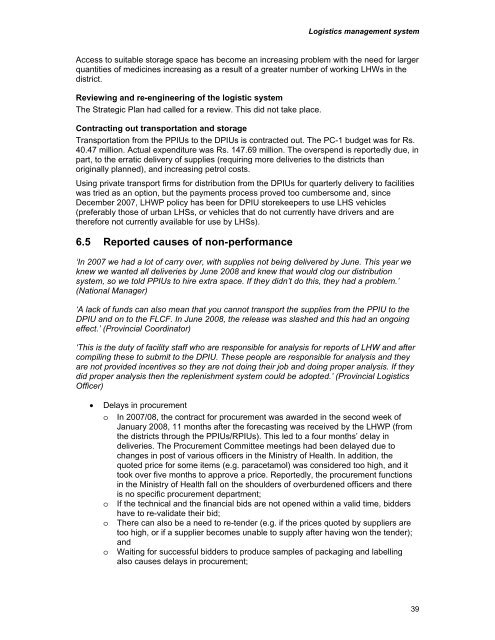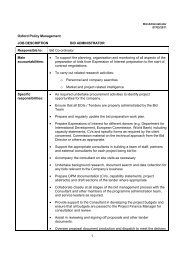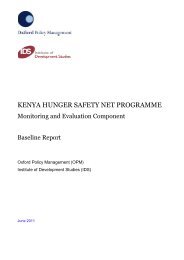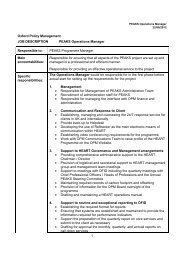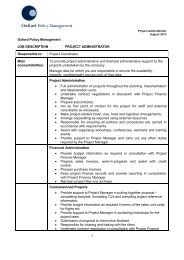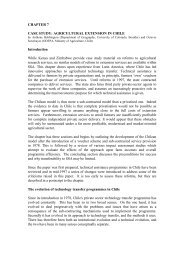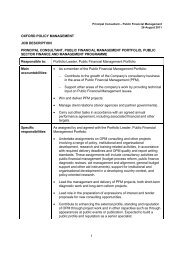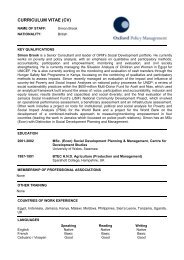LHW Systems Review - Oxford Policy Management
LHW Systems Review - Oxford Policy Management
LHW Systems Review - Oxford Policy Management
You also want an ePaper? Increase the reach of your titles
YUMPU automatically turns print PDFs into web optimized ePapers that Google loves.
Logistics management systemAccess to suitable storage space has become an increasing problem with the need for largerquantities of medicines increasing as a result of a greater number of working <strong>LHW</strong>s in thedistrict.<strong>Review</strong>ing and re-engineering of the logistic systemThe Strategic Plan had called for a review. This did not take place.Contracting out transportation and storageTransportation from the PPIUs to the DPIUs is contracted out. The PC-1 budget was for Rs.40.47 million. Actual expenditure was Rs. 147.69 million. The overspend is reportedly due, inpart, to the erratic delivery of supplies (requiring more deliveries to the districts thanoriginally planned), and increasing petrol costs.Using private transport firms for distribution from the DPIUs for quarterly delivery to facilitieswas tried as an option, but the payments process proved too cumbersome and, sinceDecember 2007, <strong>LHW</strong>P policy has been for DPIU storekeepers to use LHS vehicles(preferably those of urban LHSs, or vehicles that do not currently have drivers and aretherefore not currently available for use by LHSs).6.5 Reported causes of non-performance‘In 2007 we had a lot of carry over, with supplies not being delivered by June. This year weknew we wanted all deliveries by June 2008 and knew that would clog our distributionsystem, so we told PPIUs to hire extra space. If they didn’t do this, they had a problem.’(National Manager)‘A lack of funds can also mean that you cannot transport the supplies from the PPIU to theDPIU and on to the FLCF. In June 2008, the release was slashed and this had an ongoingeffect.’ (Provincial Coordinator)‘This is the duty of facility staff who are responsible for analysis for reports of <strong>LHW</strong> and aftercompiling these to submit to the DPIU. These people are responsible for analysis and theyare not provided incentives so they are not doing their job and doing proper analysis. If theydid proper analysis then the replenishment system could be adopted.’ (Provincial LogisticsOfficer)• Delays in procuremento In 2007/08, the contract for procurement was awarded in the second week ofJanuary 2008, 11 months after the forecasting was received by the <strong>LHW</strong>P (fromthe districts through the PPIUs/RPIUs). This led to a four months’ delay indeliveries. The Procurement Committee meetings had been delayed due tochanges in post of various officers in the Ministry of Health. In addition, thequoted price for some items (e.g. paracetamol) was considered too high, and ittook over five months to approve a price. Reportedly, the procurement functionsin the Ministry of Health fall on the shoulders of overburdened officers and thereis no specific procurement department;o If the technical and the financial bids are not opened within a valid time, biddershave to re-validate their bid;o There can also be a need to re-tender (e.g. if the prices quoted by suppliers aretoo high, or if a supplier becomes unable to supply after having won the tender);ando Waiting for successful bidders to produce samples of packaging and labellingalso causes delays in procurement;39


